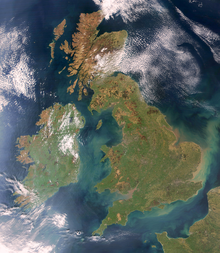British nationalism


Britons, depicted as one of the Nine Worthies in tapestry, c. 1385. The legend of King Arthur as a warrior ruler and British hero as depicted by Geoffrey of Monmouth in Historia Regum Britanniae
laid the foundation of British nationalism.
British nationalism asserts that the
British unionism, which seeks to uphold the political union that is the United Kingdom, or strengthen the links between the countries of the United Kingdom.[4]
British nationalism's unifying identity descends from the
Anglo-Irish calls for unity with Britain.[5]
It is characterised as a "powerful but ambivalent force in British politics".British prime minister David Cameron, have sought to promote British nationalism as a progressive cause.[8]
Nationalism and unionism
Nowadays, as in the past, unionist movements exist in
UKIP
support the Union. British nationalists are generally supportive of unionism.
List of British nationalist parties
- British Commonwealth Party
- British Democratic Party (2013)
- Britain First
- British National Party
- Democratic Unionist Party
- Heritage Party
- Homeland Party
- National Front
- Patriotic Alternative
- Reform UK (formerly Brexit Party)
- Traditional Unionist Voice
- UK Independence Party
- Abolish The Welsh Assembly Party
See also
- Pegida UK
- English Defence League
- Pan-nationalism
- Pan-Celticism
- British unionism
- Cornish nationalism
- English nationalism
- Irish nationalism
- Scottish nationalism
- Welsh nationalism
- Ulster nationalism
- Britishness
- Civic nationalism
- Ethnic nationalism
- Far-right politics in the United Kingdom
References
Notes
- ^ Motyl 2001, pp. 62–63.
- ^ a b Guntram H. Herb, David H. Kaplan. Nations and Nationalism: A Global Historical Overview: A Global Historical Overview. Santa Barbara, California, USA: ABC-CLIO, 2008.
- ^ Motyl 2001, pp. 62–64.
- ^ Miller 2005, p. 133.
- ^ Brendan Bradshaw, Peter Roberts. British Consciousness and Identity: The Making of Britain, 1533-1707. P. 302.
- ^ Smith, Smith & White 1988, p. 61.
- ^ a b Motyl 2001, pp. 64.
- ^ Conservative Party leader David Cameron advocates liberal or civic British nationalism: "Cameron: I will never take Scotland for granted". Conservatives. 15 September 2006. Archived from the original on 24 September 2012.
Being British is one of the most successful examples of inclusive civic nationalism in the world.
The official party site.
Bibliography
- Miller, William Lockley (2005), "Anglo-Scottish Relations from 1900 to Devolution and Beyond", Proceedings of the British Academy, 128, Oxford University Press, ISBN 978-0-19-726331-0
- ISBN 0-12-227230-7.
- Smith, Michael; Smith, Steve; White, Brian (1988), British foreign policy: tradition, change, and transformation, Routledge, ISBN 978-0-04-327081-3
